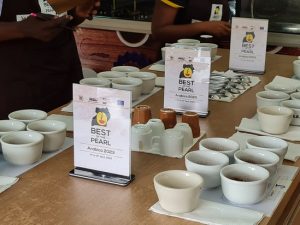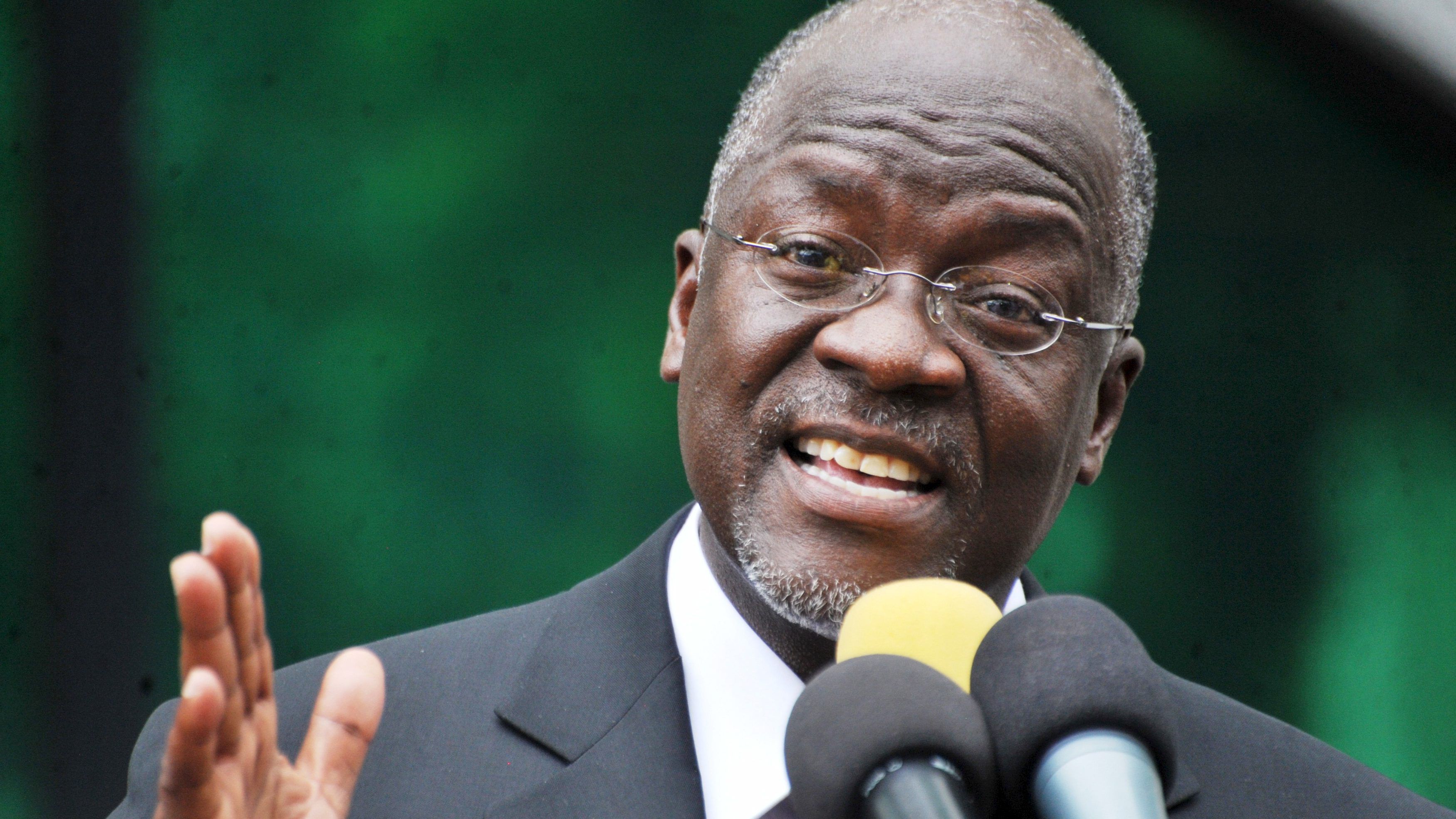Judges in a cupping session during finals of the 3rd Best of the Pearl 2023 Arabica Competition
On Thursday, Uganda Coffee Development Authority (UCDA) held the finals of the 3rd Best of the Pearl 2023 Arabica Competition at the Authority’s Quality Laboratory in Lugogo, Kampala.
The competition, organized by UCDA in partnership with the Uganda Coffee Federation and supported by the European Union through the Coffee and Cocoa Value Chains Development (CoCoDev) Project, aims to celebrate Uganda’s best coffees focusing on Uganda as an origin.
Veronicah Najjemba Kawuki, the Value Addition and Promotions Manager at UCDA, says the Best of the Pearl Competition focuses on recognising and awarding Ugandan farmers, cooperatives and exporters of high-quality Arabica and Robusta Coffees.
“The Best of the Pearl Arabica Competition celebrates coffees from Arabica growing regions particularly the Elgon, Rwenzori, Kigezi and Zombo regions,” Najjemba says, adding that the Arabica competition is normally held in April after the main harvest season of Arabica.

On the other hand, the Best of the Pearl Robusta competition is held in August after the main harvest season of Robusta with the aim of celebrating quality coffees from the Robusta growing regions of the West, South West, Central, East and North.
Benefits of Best of the Pearl Competition
Najjemba says that all coffee producers including individual farmers, farmers’ groups, cooperatives and exporters are eligible to participate in the competition as long as they have high-quality coffee and enough quantities that can be sold in case their coffee performs well and buyers demand it.
Asked about the benefits of participating in such competitions, Najjemba said that the winning coffees get visibility because they are promoted as high-quality coffees in coffee conferences, expos and exhibitions in Uganda and around the world such as the Specialty Coffee Expo in the USA, World of Coffee Expo in Europe and the Specialty Coffee Association of Japan as well as at international business summits.
“We get many potential buyers interested in buying coffee from various origins. We link the potential buyers of our coffee to the producers,” Najjemba said in an interview at the UCDA Laboratory in Lugogo.
She adds that the winning coffees are also submitted to other international competitions such as the African Fine Coffee Association that further promotes and markets them.
“The coffees get potential buyers from such competitions,” she says, adding that the coffees are also promoted through various channels including the Coffee Quality Institute website.
“Importantly, we provide feedback to all competitors to help them improve on the quality of their coffees,” she says.
Asked what UCDA is doing to promote value addition, Najjemba said the coffee agency promotes value addition along the entire coffee value chain.
She says UCDA has agronomists in all coffee growing areas that offer technical support to farmers to produce quality coffee.
“We also offer training for various actors along the value chain. Besides farmers, we train quality controllers and processors. We also have trainings for brewers and roasters,” she says, adding that UCDA also monitors all coffee processing facilities in order to ensure that all the coffee that is processed meets national and international standards.
It should be noted that UCDA has a coffee testing laboratory that is ISO 17023 certified with “competent staff that ensures that coffee produced comply with national and international standards.”
Brenda Kemigisha Mangeni, the Best of the Pearl Head Judge says this year UCDA received the highest number of samples submitted since the competition started three years ago.
“We had 76 samples submitted; 41 of these were washed, 29 were natural and only six were honey processed. These were from 21 farmers, cooperatives and exporters,” Kemigisha, who is one of UCDA’s Promotions Officer, said in an interview.
She says the high number of samples submitted is a sign that the competition is increasingly getting attention and benefiting participants more. She says it is also increasing the interest of farmers to produce high-quality coffees because they (quality coffees) fetch premium prices.
Asked about the general overview of the judges about the coffees that have been cupped and graded, Kemigisha said: “This year we noticed that the coffees were higher scoring both in green grading and cup scores. The flavour profiles were more diverse and complex.”
“The quality was really good. Some coffees stood out. We hope next year will be better and bigger,” Kemigisha says.
On what this means for Uganda’s coffee sector, Kemigisha says: “It means that the scores are improving. The profiles are becoming better for the buyers and more interesting. They are not monotonous like in the past. They (coffees) are getting more complex and have the ability to compete with other regions that previously may have had better profiles than ours.”
Criteria to choose the winning coffees
Kemigisha said the judges use internationally accepted protocols that were developed by Coffee Quality Institute (CQI) and Specialty Coffee Association (SCA).
“The protocols guide us on how to score the coffee. There are standard and international protocols. We are trained as Q-graders by [CQI and SCA]. We look at the flavour, aroma, fragrance, after-taste, acidity, body, balance and uniformity of the coffee in the cup. A perfect cup should have high scores in each of those attributes,” she says.
Asked about the neutrality and fairness of the judges, Kemigisha said the competition is “cupped blindly.”
“We have a separate team that is organising the samples and coding them. They are independent of the judges. We are neutral because if you see code A you don’t know which company it is. The decoding and finding out which sample was code A is done at the end of the competition as we determine the winners,” Kemigisha said.
Other judges for this year’s competition are Naume Komuhangi, Jonathan Mugerwa, Jacob Batereiregha and Donald Isingoma.

Farmers should pay attention to post-harvest handling
Kemigisha says farmers are trying their best to produce coffee quality, but more emphasis should be put on post-harvest handling.
“They (farmers) only need to put more efforts on post-harvest handling but so far they are doing a good job going by the samples submitted,” Kemigisha says, adding more farmers, cooperatives and exporters should submit their samples in the forthcoming competitions.
“The winners can always be bench-marked to learn on the best practices to improve on their quality,” she says.

She applauded the Uganda Coffee Federation, the European Union through the CoCoDev Project and the Ministry of Agriculture, Animal Industry and Fisheries (MAAIF) for their support and for making the competition a success.







Good but I want to become a Q grader what are the requirements